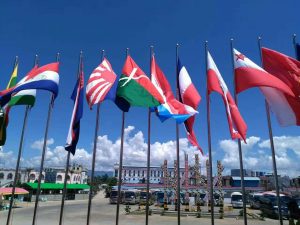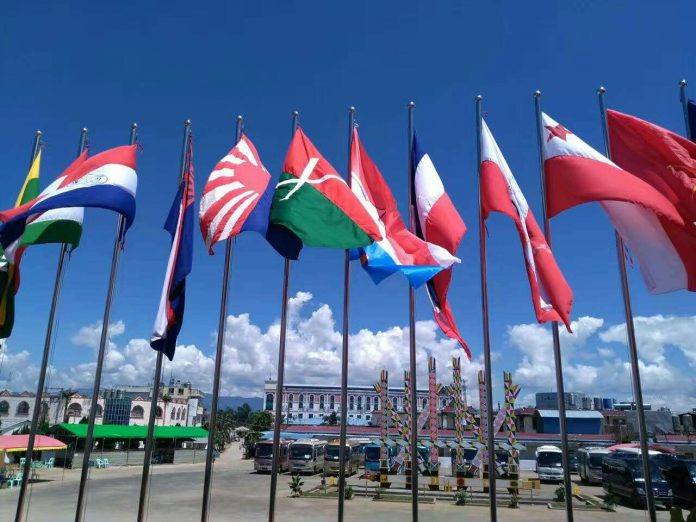The 21st Panglong Peace Conference has been completed in Myanmar. The public expects genuine peace, unity, liberty and equity by the end of the conference. The four day assembly was also widely reported in the local, national and international press. Leaders, delegates and speakers have given their best shot at achieving peace, unity and prosperity but harmony within people across the nation must be observed. Clashes of principle, ideology, framework and proposal for a new formation of a ‘democratic federal union’ have appeared but the door is open for further debate and discussion.
Most leaders from each race, party and ethnicity have expressed their views on the three different ideas; on nationalism, federalism and ethnic-centric political framework in Myanmar. There were over sixty speakers but the argument on principle was on display between the military’s representatives (Tatmadaw), and armed ethnic leaders including some members of the ruling party, the National League for Democracy. The case for national defence issues appeared widely on the floor.

The above ten point proposal should be examined from legal, political and operational angles by politicians, MPs, and other legal professionals in the next round of leaders’ meeting but it will require time, space and scope of rationale within the context of the current expectation of the entire nation. The ten point document is a matter of complex in both legal and constitutional terms.
Most armed ethnic leaders and delegates from the ethnic organizations proposed a new ‘state’ or ‘territory’, including a ‘Burman State’ in the three part of region upper-land while the non-ethnic representatives stressed the matters of gradual constitutional change, improved local autonomy, strengthened legal and administrative frameworks to the local government. Speakers from the non–armed organizations stress justice, economy and the public’s welfare while the core issues of the leading role of the military’s representations in the parliament is widely protested as a non-core principle of ‘democratic institution’ in the world.
The words of Daw Aung San Suu Kyi in her closing remarks were a critical moment when she declared to the delegates that it is time to act for the rest of ‘your life’ in pursuit of peace, unity, equality and a meaningful way of solving humanity’s problem by wisdom, compassion and respect for the dignity of everyone.
The Union Peace Conference was completed within a week but the complex issue of ‘power sharing’, local autonomy, constitutional rights to the state, amendment of the current constitution (2008), and the separation of power between the military and civilian in each level of governance. There are different frameworks, proposals and action plans tabled during the conference but the leaders have committed to find common-goals for the nation.
Nationalism is a matter of politics but federalism is a matter of legal framework that the leaders of the nation could draw a line. Federalism is a process of administration of the people; it is rather not a logic of politics to be claimed in one way or another. Federalism is designed on sharing power, administration, taxation, finance and other local public services. If armed ethnic leaders push for nationalism ahead of federalism, the process for peace, unity and equity to the people will be jeopardised in the context of social, economy and public welfare. Public welfare is at the core centre of federalism at large in any western world.
I have been living and working in Australia for close to twenty years since 1997. Australia’s federation is matured but it is working in progress with the modern political trend. The federal have a clear set of roles on defence, taxation, economy, finance, education, health, foreign affairs, welfare, aged care, families services, disability and unemployment programs, transportation and communication, housing and community services, and immigration to list a few but the role of the State Government is to have a more focused power in local issues such as schooling, housing, road and transportation, water and resources. As far as I am informed, federalism is a matter of sharing roles and responsibilities with the nation and people within set of ‘rules’, or as amended by the constitution of the nation. It is neither placed at the centre of one race, one location and one group of people at the expense of another. It has a way of sharing the resources with accountability but it is also doing the duty with transparency. It has clearly defined the roles and services provided between the Federal and State/Territory governments. The local government has key roles and responsibilities in social, cultural and community recreational programs such as building schools, parks, hospitals, and other community resources such as cemetery services in each town and city. It has, in fact, a process of collecting tax and revenue but the allocation of funding to each local government programs must meet a fairness test.
After I read, listened and observed the news, as well as the Burmese language newspaper with a full printed report during the four day conference, I have found that most speakers and representatives use the words ‘democracy and federal’ in imaginative terms rather than a practical process. However, the speakers have the good wishes of the people of the nation in different contexts. It is time that neither the Burman nor the non-Burman ethnic leaders find the common–room for improvement in addressing the clash of principles, frameworks, proposal for sharing power, and re-structuring of local administration. I argue that federalism is a process of working together on sharing roles, responsibilities, power, resources and local administration for the entire people regardless of race, location and political groups. Federalism should be above nationalism if our nation seeks equality, liberty and peace for all. It is a matter of working under the set of rules, legal frameworks, checks and balances between the Union and State government. The Union and State/Regional Parliament have the core duty of action. The process is a long path to unity, peace and liberty.
In 2025, a united State of Myanmar or a United State of Golden Land should be celebrated with dignity. The Peace Conference is a process for change but the process should be guided by the rules agreed by the stakeholders. Nationalism is a state of pride but federalism is a process.

